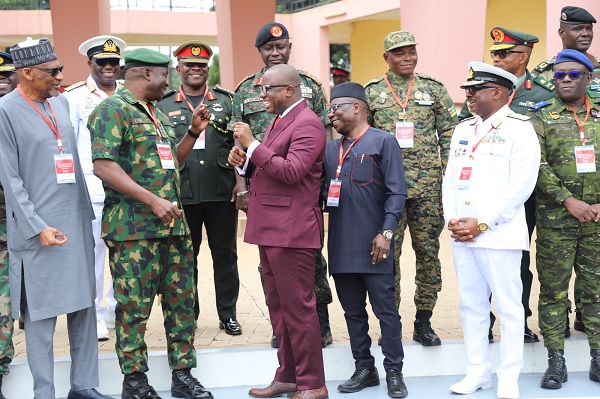The Chairman of the ECOWAS Committee of Chiefs of Defence Staff (CDSs), General Christopher Musa, has said that democracy should not be stifled in the sub-region.
At the opening of a two-day meeting of ECOWAS military chiefs in Accra yesterday to plan a path to democracy in Niger, he said democracy was rather meant to be peaceful, hence the need for all parties to proactively chart a course that would promote democratic principles across the sub-region.
General Musa further called on both the military and civilian populations to build a more resilient ECOWAS that would not just limit its work to addressing the situation in Niger, but ensure stability and growth within the sub-region.
The meeting of the military chiefs was called to plan the path of action for an intended military operation to restore democratic rule in Niger, following the ousting of President Mohamed Bazoum last month.
Mali, Burkina Faso, Guinea and Niger, which are under sanctions and have been suspended by ECOWAS for the military takeovers in recent times, were all absent.
Cape Verde and Guinea Bissau, officials said, were also absent with genuine reasons.
Democratic governance
Ghana’s Minister of Defence, Dominic Nitiwul, urged military forces of nations in West Africa to allow the citizenry of their countries to choose their leaders and not interfere with democratic governance.
He said although the militaries across the sub-region had the right to ask their governments for logistics to defend their nations and territorial sovereignty to ensure they remained peaceful, democratic governance must be allowed to thrive.

Also the Member of Parliament for Bimbilla, the Defence Minister who opened the meeting of Chiefs of Defence Staff of ECOWAS member states, said the West African sub-regional bloc, once the toast of the international community and the investor world, was gradually sliding back to the days of coups and military takeovers.
“Your presence here in Accra alone, for this very important meeting, gives a powerful message to the world that we are united in carrying out the directives of the Heads of State and Government, and I am hopeful that this meeting will put in place the necessary strategic plans to ensure the activation of the Standby Force towards the restoration of democracy in Niger,” Mr Nitiwul said.
Mr Nitiwul said the sub-region was going through one of the most difficult moments after the challenges of the 1960s, 1970 and 1990s and it would be important for the military leaders to continue to be loyal to their Heads of State as well as the ECOWAS directives, “so as to give effect that the days that coups d’état enjoyed the support of our people are over.”
The Defence Minister said the recent takeovers by military aides who held their presidents hostage was a demonstration that “nobody is safe” in the sub-region.
ECOWAS
The ECOWAS Commissioner in charge of Political Affairs, Peace and Security, Dr Abdel-Fatau Musah, said ECOWAS had a duty towards the people of the sub-region.
“ECOWAS has a duty to protect its protocols which prohibit military intervention in politics, and the fact that we have had three successful coups in recent times does not mean we ought to go with the flow,” Dr Musah said.
He emphasised that the justification of the coup using insecurity and economic conditions were unacceptable, considering that the aftermath of COVID-19 and the current global economic downturn was having a devastating impact on livelihoods across the world.
“Let no one be in doubt that if everything else fails, the various forces of West Africa are ready to answer the call to duty, as they have done it in the past and they will do it again,” Dr Musah said.
He debunked suggestions that ECOWAS was being influenced by the West and France to undertake the deployment.
ECOWAS, Dr Musah added, was undertaking the deployment on its own resources and financial arrangements to make sure constitutional order was restored in Niger.
He stressed, however, that “if other democracy loving partners want to support us, they are welcome to do so”.

The Political Affairs, Peace and Security Commissioner also expressed worry at calls by persons within the sub-region against the deployment of the Standby Force, questioning why those calls were not made when similar deployments were made to the Gambia, Cote d’Ivoire, Sierra Leone, Liberia and Guinea in the past.
Ghana
Ghana’s Chief of Defence Staff, Vice Admiral Seth Amoama, said the scourge of terrorist armed groups (TAG) and violent extremist organisations’ attacks and activities had been a source of worry to every government in the sub-region as countries were paying heavy prices for the loss of human life, deterioration of critical infrastructure, school dropouts and lingering humanitarian crisis, among others.
He expressed the hope that the CDSs would put their rich experiences together to be able to activate the ECOWAS Standby Force to enable them to respond to the demands placed on the committee by the Heads of State.


































